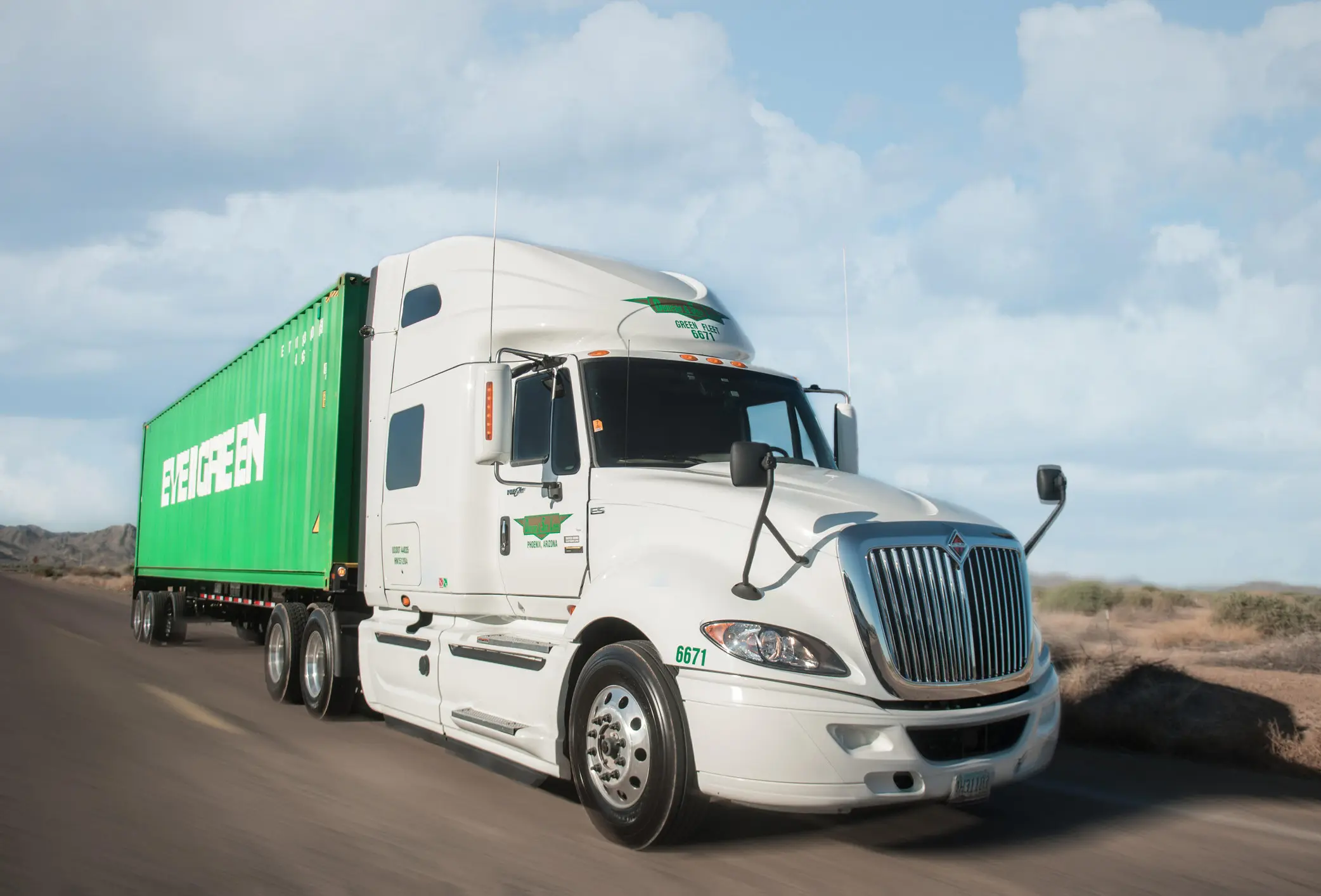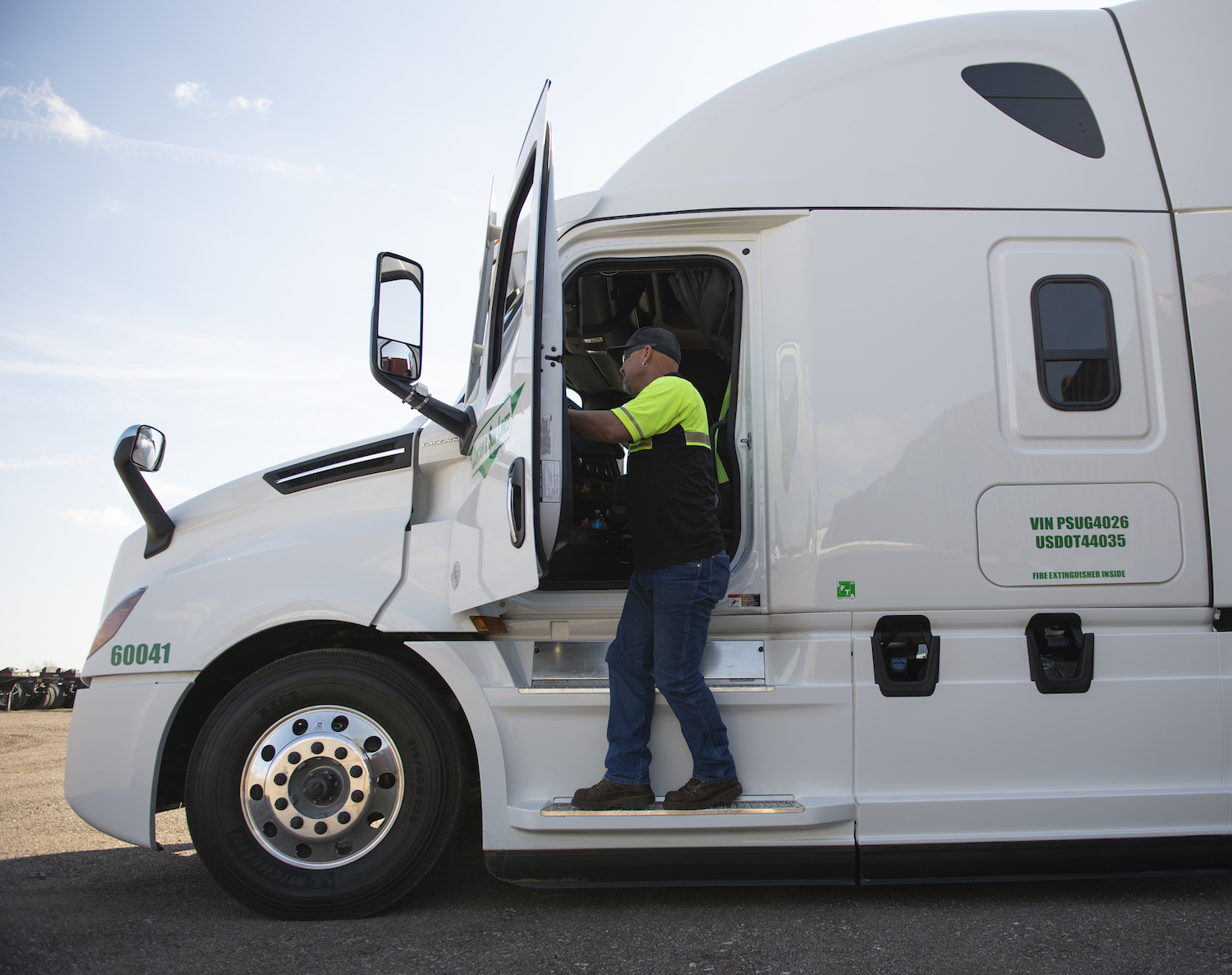
Family Tradition
With nearly 70 years in business, Duncan and Son Lines has seen both the challenges and rewards that come with being a family-owned trucking business. Richard Blaine Duncan Jr. and his son Rick shepherded the once small company through tough times to grow into a 200-truck operation today. Rick’s sons are next in line.
Rick Duncan’s grandfather, Richard Blaine Duncan Sr., founded the company in 1943 with two flatbed trucks he used to haul cotton, grain and produce throughout the southwest. At that time, truckers in Arizona needed permits to operate within specified areas. Duncan and Son’s first permit allowed the company to haul within a 25-mile radius of Buckeye. By the 1950s, Duncan Sr. had acquired a new permit (then valued at $250,000) to work anywhere within the state of Arizona, and he primarily transported cotton and ore.
When deregulation hit in the early 1980s, the company had to scramble to survive.
“Deregulation hurt us,” says Rick Duncan, current president and grandson of the founder. “It broke down the barriers of entry into the business, and some of our former drivers were competing against us.”
The company had to get a lot smaller, going from about 70 trucks to 20, and the Duncans had to move out of their comfort zone.
“We had to regroup, to start over. It was tough times,” Rick recalls.
Being family-owned turned out to be a strength that helped the company get through deregulation.
“We operated in a very conservative manner because we are a conservative family,” says Rick. “Being conservative meant we did not borrow against our operating rights, which became useless overnight. It also meant that we could pull back our horns and circle the wagons, so to speak, in order to weather the lean times.”
Passing the torch
Still, while family can come together when necessary, those same close relationships present certain difficulties. Rick’s father, Richard Blaine Duncan Jr. (who is now retired), found that transitioning leadership from the first generation to the next was challenging. He had his own business ideas that he felt strongly about.
He was eager to expand, invest in equipment and move the company forward, but his father was eyeing retirement and was conscious of expenses and cash flow. The two had to find a way to meet both of their needs.
“My grandfather had nursed the company from infancy to where it was and saw it as his baby,” says Rick.
Such an attitude is not unusual for company founders who often find it difficult to release control, says Duff Swain, president of the Trincon Group, a trucking business consulting firm.
“Some of that has to do with the fact that companies of this type often were started by larger than life, entrepreneurial characters who raised their families and operated their businesses in much the same way,” Swain says.
Getting past such an obstacle requires discussion. What does each participant want? Why is it important? How can the different goals be reconciled?
“The company should try to accomplish the needs of both parties,” Swain says.
In the case of Duncan and Son Lines, Richard Blaine Jr. focused his expansion efforts on buying near-new used equipment to save on costs, but still provide quality service. He also made sure he kept his father informed of every move he made.
“My father was very cognizant to keep my grandfather in the loop on major expenditures,” says Rick.
Looking past their backyard
One early investment the company made under the senior Duncan was to build a 26-acre container yard in Phoenix so that it could start hauling ocean containers to the West Coast. With the nation’s textile industry moving into outsourcing, manufacturing of products overseas, it seemed like a good move. Cotton companies were interested in getting their products to ports in Los Angeles and Long Beach, Calif., and then overseas.
“Our cotton customers helped us because they wanted a cheaper way to get their product to port,” says Rick.
Even so, the Duncans had to pound plenty of shoe leather into the pavement to sell their services.
“We just got out and started going everywhere in the country where there was a shipping line or a customer,” Rick says. “We got a break in the late 1970s when one of the shipping lines started using us. That got our foot in the door.”
That was around the time that Rick’s sons, David and Blaine, who are now 32, were born.
Learning the ropes
Each of the younger Duncans started working for the company when they were in their teens, sweeping the floors and doing other entry-level work.
The sons say that these early experiences were invaluable in giving them a feel for the trucking industry and whether they wanted to be in it. It also gave them an overall view of the company’s various facets and departments.
“We got to know a little bit about each function,” says Blaine, adding that they also got a better understanding of what roles within the company would best suit their talents and interests.
“It is a matter of trying to figure out what makes each of us tick and where each others’ strengths lie,” says Rick.
David rotated through various departments including accounting, dispatch, safety and loss prevention. That last role involved a somewhat unique task — branding tires.
“We’d put our name on the tires to keep them from being stolen,” David says. “Imagine branding tires in 110-degree heat. It was bad enough that I only did it two weeks.”
David decided to keep his focus on operations and dispatch, where he came face to face with people rather than tires.
“I like interacting with the drivers and the customers,” he explains.
Early on, Blaine decided he wanted to understand what it was like to be one of the drivers.
“I got my CDL,” he says. “And I worked in the shop. It really taught me about maintenance. I broke down a couple of times so I know what a driver feels like sitting on the side of the road.”
Today, David is vice president of operations and Blaine is director of equipment and maintenance. Their father handles administrative and financing duties and manages growth.
The importance of family
Besides investing in maintaining safe equipment, the company also has invested $12 million over the past few years to make its fleet more fuel efficient and cleaner. An added incentive is that shipping ports are imposing higher fees on trucking firms that want to enter their ports, but which are not operating a green fleet.
Being a conservative family and maintaining good credit meant the company was able to make that large investment when it was needed.
The company now has about 200 trucks, most of which are its own. It also hires between 25 and 80 independent contractors, depending on demand.
Rick says having strong family ties means the company also is aware that their employees have families and relationships that must be tended.
“We try to get our truckers home a couple of times a week,” Rick says. “That helps us attract a better quality employee.”
Being in a family business is a thrill for Rick, who likes being able to work alongside his sons.
“When you work with family, you can have that level of trust that might be difficult with other people,” he says.
Despite that bond, he believes that it’s important in a family-owned business to make family members aware before they get into it about the many demands and expectations that it will entail.
“You have to be upfront about the amount of work that’s involved,” Rick says. “But if you get out there and hustle you can keep everyone busy.”
The Duncans say that the bottom line when it comes to staying in business and growing over nearly seven decades is being fair and honest with others and also appreciating the value that each family member brings to the table.
http://roadking.com/2011/05/family-tradition/
Categories
- News Release


